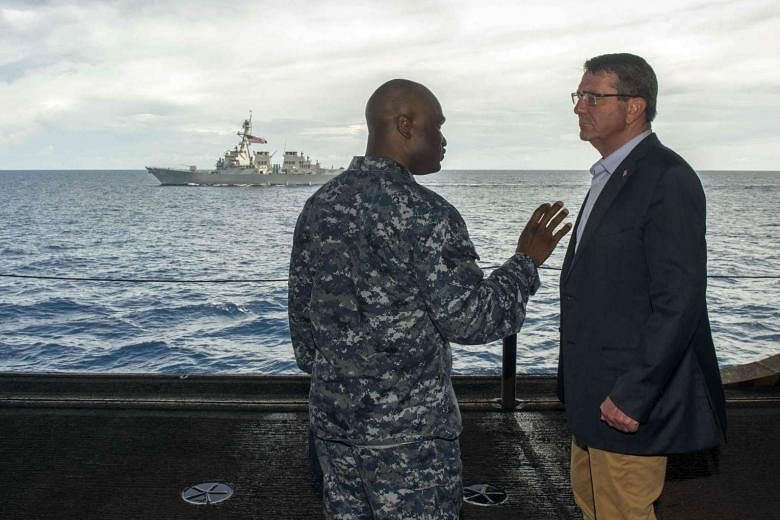Aboard the USS Theodore Roosevelt (AFP) - As the United States and China engaged in a standoff last week over an American naval vessel in Chinese-claimed waters, frontline officers from the two sides bantered about chicken wings and Halloween preparations.
Washington sent the guided missile destroyer USS Lassen to the South China Sea for a "sail-by" of Chinese-built islands that have raised concerns over Beijing's deepening toe-hold in the strategic waterway.
The move brought angry denunciations from China, which said its sovereignty had been violated, with US defence officials countering that American ships would continue such sailings.
But despite the big-power ramifications, radio contact between the two sides at the scene was frequent and surprisingly relaxed, according to an account of the close encounter by the USS Lassen's skipper, Commander Robert Francis.
"Every day a US ship is down here, we interact with the Chinese," he said. "It's not uncommon for one of my officers on the decks to pick up the radio and start talking (to the Chinese)."
Francis spoke to reporters on Thursday (Nov 6) after being helicoptered over from his ship to the USS Theodore Roosevelt - also cruising the South China Sea - during a visit to the giant aircraft carrier by US Defence Secretary Ashton Carter, who was on a diplomatic swing through Asia.
"We picked up the phone and said, 'Hey, what are you guys doing this Saturday? We got pizza and wings, we're doing this, we're planning for Halloween as well,'" Francis said, recalling exchanges with the Chinese navy.
"So, discussions of that nature, just trying to show we are normal sailors like them, have families just like them."
On Oct 27, the USS Lassen cruised within about 10 km of Subi Reef in the Spratly Islands, a sprinkling of reefs and islets at the heart of the South China Sea that also is claimed in whole or part by the Philippines, Vietnam, Malaysia and Taiwan.
Subi reef is just one of the South China Sea sites where Chinese dredgers are creating expanding land masses capable of hosting large facilities, including runways.
A Chinese destroyer shadowed the USS Lassen, repeatedly querying why it was in "Chinese waters".
"I wouldn't call them warnings," Francis said.
The US vessel's carefully stage-managed "freedom of navigation" transit - close enough to see construction cranes and other features on land - was meant to subtly challenge China's sovereignty claims and stress the right to international free passage.
The South China Sea has long been viewed as a potential flashpoint for military conflict.
Those concerns have grown in recent years as China has taken a more assertive stance toward its long-standing insistence that virtually the entire sea is sovereign Chinese territory.
The island-building programme has accelerated within the past two years, and rival claimants to the body of water say it violates a regional code against provocative moves that could upset the maritime status quo.
Francis said he was surprised by the attention drawn by last week's encounter, calling the episode "just a normal day."
"I got a call from my mother and she was going, 'Hey, what's going on with you in China? I heard you were in China,'" he said.
"I was like, 'Mom, I'm not in China. I'm OK, I'm on the ship.'"

